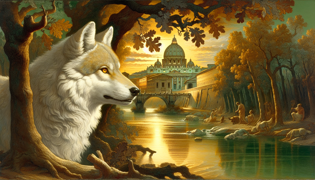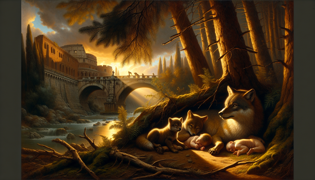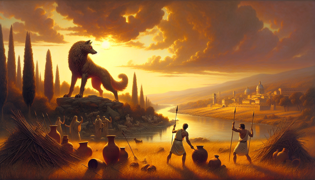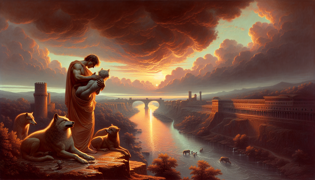Romulus and Remus: The Legendary Founders of Rome
Reading Time: 9 min

About Story: Romulus and Remus: The Legendary Founders of Rome is a Myth from italy set in the Ancient. This Dramatic tale explores themes of Perseverance and is suitable for All Ages. It offers Cultural insights. Twin princes nursed by a she-wolf overcome fate to establish an eternal city.
Introduction
The riverbank lay silent at dawn, mist coiling like restless spirits among reeds. A woman’s trembling cradle floated free on the brown-green tide, the twins inside too small to grasp the world’s weight. Yet fate was a cunning sculptor, shaping destinies with deft hands. Romulus and Remus drifted like fallen stars upon the Tiber’s currents, abandoned by human mercy but not by nature’s fierce generosity.
Damp earth smelled of moss and hidden roots as a low growl broke the hush. A she-wolf emerged, her coat a tapestry of midnight velvet and moonlight threads. Her amber eyes flickered with maternal fire; she lifted the infants from the cradle, as tender as a leaf cradled by morning dew. In bocca al lupo, whispered the breeze through ancient oaks.
The forest seemed alive, each heartbeat of wind or rustle of underbrush bearing witness. Mamma mia, the wild called to her quite plainly: these children were hers to nurture. Through nights scented with pine resin and stars singing silently overhead, she fed them and guarded their sleep. Their cries were soft as church bells in the distance, echoing across the hills.
Thus began an extraordinary brotherhood, bound by survival and starlit vows. The she-wolf’s breath, warm upon their cheeks, was a promise of resilience. From this cradle of fate would rise the founders of an empire. Somewhere beyond the whispering leaves, destiny stirred, eager to mould mortal men into legends.
The Exile and the Flood
In the palace atop Alba Longa, the infant twins were regarded as omens—portents of both hope and peril. King Amulius, fearful that the prophecy of Numitor’s heirs would undo his reign, commanded their secret disposal. A brutal decree saw the infants sealed in a wooden chest and cast into the swollen river like driftwood lost to swirling currents. The Tiber roared beneath oppressive skies, rain drumming upon the water with the insistence of a drummer in a legion’s march.
By luck or design, the cradle ensnared among tangled roots at the river’s edge. The wood was waterlogged, its grains swollen and slick, exuding the acrid tang of silt and fallen willow leaves. A low, rhythmic rumble rose from the rapids—a chorus that sounded half lament, half lullaby. In that moment of fragile stillness, a lone she-wolf emerged, the forest her cathedral.
Her paws pressed into soft moss, each step measured as if guided by the gods themselves. The infants’ cries had grown faint, but the she-wolf’s ears remained keen as a huntsman’s. She nudged the crate open, revealing the pale-faced boys whose destiny she would cradle. Her jaws, gentle as a mother’s kiss, lifted each with delicate strength. Fur damp with dew brushed against the infants’ skins, a soothing warmth like hearth embers.
Under the canopy of whispering leaves, the forest held its breath. Twilight filtered through branches, painting shadows in warm ochres and burnt sienna. The wolf-mother carried her charges to a hidden den, deep within bramble and root. Here, the scent of damp earth was thick, the hush broken only by distant owls and the gentle sigh of wind through twig and thicket. Each night, she lay curled around them, her heartbeat a steadfast drum that spoke of safety amid wilderness fraught with danger.
This act of defiance against mortal decree bound the brothers to a primal force. They were nurtured by instinct rather than courtly soot, taught the language of survival in the valley’s hush. In bocca al lupo, blessed the old forest, as their story began to carve itself into legend.

The She-Wolf’s Care
Days bled into nights in the wolf’s hidden lair, each moment tempered by the primal chorus of the woods. The twins, though delicate and pink as freshly plucked roses, developed lungs that withstood hungry bawls. Their cries reverberated against rock walls, echoing like distant bells in an empty basilica. Each howl taught them both vulnerability and strength, a dual lesson that would shape their souls.
The she-wolf, dark as midnight velvet, guided them to new discoveries. When hunger gnawed their bellies, she would hunt for hares in the mist-shrouded undergrowth. The scent of crushed ferns rose like incense as she bounded through the glade, haunches coiled with rippling muscle. The flesh she returned with was warm, blood-sweet, and shared equally. Brothers learned early that no feast was taken alone.
Every dawn, a chorus of birds greeted them—larks ringing clear as church chimes, nightingales weaving silvered trills amid thickets. The infants gurgled and reached for trembling leaves, tasting the world’s rough edges. On damp stones below a waterfall, they crawled, their knees bruising on the river’s smooth gems. The spray smelled of wild mint and freshness, cool droplets chiseling their skin like carving chisels on marble.
By the time they toddled upright, they wielded a strange power: the gaze of a wolf and the heart of men. Their laughter rang like turmoil subsiding after a storm, breaking the solemn hush of ancient woods. At dusk, the wolf would cradle them close, her breath a warm, reassuring hum against their ears. Above, stars spilled across the sky like powdered sugar on richly glazed icing.
Then, one morning scented with cedar smoke and ripening berries, two shepherds stumbled upon the den. Their shepherd’s crooks and coarse tunics seemed out of place amid the tender hush of moss and lichen. When they saw twins suckling, they gasped as though the forest itself had given birth to myth. Romulus and Remus, wolf-nurtured and human-born, would soon find their path entwined with mortal courts and royal ambitions.

Brothers of Destiny
Raised now by Faustulus, a humble shepherd of Numitor’s line, the twins grew hardy and cunning. Their limbs were lean as saplings, coiled with playful strength. Each dawn they raced along ridge and glen, leather-clad feet stirring pine needles. The air tasted of early grape blossoms, sweet and elusive.
They learned the language of flocks and stormclouds alike. When thunder growled across the hills, the brothers dared one another to stand unflinching beneath its roar. Their spirits sparked with youthful fervour, as bright as lightning fracturing a brooding sky. Yet beneath their boisterous jests lay fierce loyalty: neither would leave the other to wolves or men.
Faustulus often warned them against venturing too near the city walls of Alba Longa, where Numitor’s coiled schemes still threatened his life. But ambition is a river that longs for the sea. Romulus, ever restless, carved wedges of driftwood into tiny spears. Remus, with eyes alight, practiced spear-throwing at stones that tinkled like bells upon impact. Their training was a patchwork of herding craft and wolf-born instinct.
A chance encounter with royal guards changed everything. Accused of shepherding stolen sheep, the twins defended their honour with blows that fell like hammer blows in a smithy. Remus’s laughter rang even as he felled foes twice his size; Romulus’s glare was a torrent that cowed even veterans. News reached King Numitor, who discerned the truth behind their lineage. Long-lost blood roared in their veins, as staunch and red as ripened pomegranate.
Thus the brothers learned their heritage, bound by vengeance and duty. They must choose: remain sons of the wild or reclaim a stolen throne. And yet destiny had other designs, whispering of walls not yet raised and an empire born from fraternal strife.

The Strife and Founding
With Numitor’s counsel, Romulus and Remus rallied supporters from countryside and camp. Veterans of wolfish ferocity and rustic courage, they marched upon Alba Longa under banners of deep crimson and steel. The siege was swift—a roar of shields and war cries that echoed against aged ramparts. Torchlight flickered across stone, turning every crack into a seam of molten gold.
Yet the greatest storm was not wrought by mortal arms but by brotherly dispute. When the time came to found a new city on the Palatine Hill, Remus leapt the planned boundary trench in jest. He crowed triumphantly, arms raised like a herald announcing dawn’s arrival. Romulus’s face darkened; lines of rivalry cut deeper than any chariot blade. Words spat like firebrand sparks over smouldering tinder.
The quarrel flared under a sky mottled with storm clouds, thunder murmuring like an unseen tribunal. Remus mocked the wall’s scant height—“Six cubits will do for floodwaters, not our grand city.” In return, Romulus’s retort was a flash of steel. One blow caught Remus on the temple, and he crumpled like a broken column.
Silence fell, heavier than any battle din. Yet from that silence rose the murmur of destiny. Romulus wept, tears mingling with rain, each drop a vow of remembrance and regret. He laid his brother’s form upon the prepared earth as offerings of first harvest—grains and salted wine—were cast at Remus’s feet. In that chiaroscuro of sorrow and triumph, Rome’s first seed was planted.
By dawn, the walls of Roma Quadrata rose like a promise against pale sky. Palms and laurels were consecrated, and the dove of pax fluttered above stony threshold. Though born of strife and shadow, the city’s heart pulsed with hope and perseverance. The wolf’s distant howl carried across the new ramparts, a reminder that from wild beginnings can blossom imperishable glory.

Conclusion
As the morning sun gilded the Palatine stones, a hush enveloped Rome’s nascent streets. Every brick laid was a testament to blood, loss and fraternal sacrifice. The wolf’s howl in the distance seemed to salute the newborn city, its echoes weaving through colonnades yet to stand. Beneath the arches of memory, Romulus walked alone, his heart both hollowed by grief and swelling with resolve.
He consecrated the city to Mars, invoking courage for ages yet unborn. Bells of victory rang in his mind, though none pealed above the Tiber’s calm murmur. The air tasted of crushed thyme and stone dust, a scent as sharp and eternal as the tale itself. Traders and travellers would one day hail Rome as caput mundi—the world’s capital—yet its cradle remained a bed of wolf-fur and tears.
Generations hence would sing of twin princes and a mother of the wild. They’d craft marble statues that gleamed like captured sunlight, and poets would compare Rome’s rise to a phoenix ascending from ash. But the true shape of the city was carved by a brother’s final blow, as jagged as lightning yet smoothed by memory’s gentle hand. The echo of perseverance rang brighter than the clash of swords.
Thus, from soft whimpers beneath moonlit oaks and iron-wrought ambition, Rome was born. Its story, at once savage and sublime, became thread in the tapestry of civilisation. And when at last the wolf’s ghost glided through twilight avenues, her spirit whispered of beginnings humble and wild—where grit and grief converge to grant immortality.

















